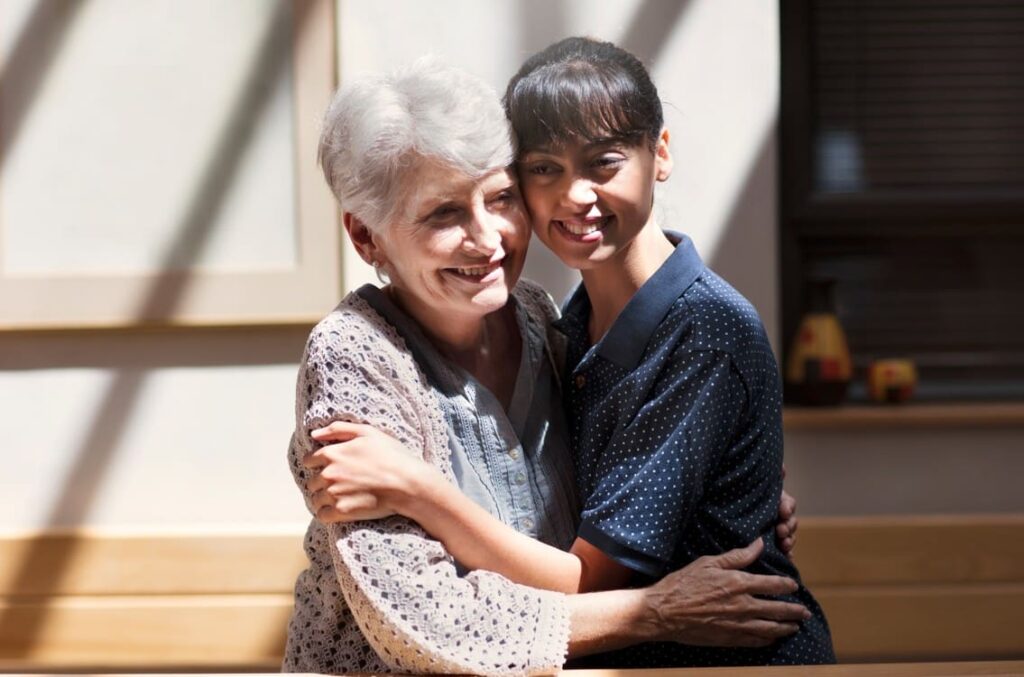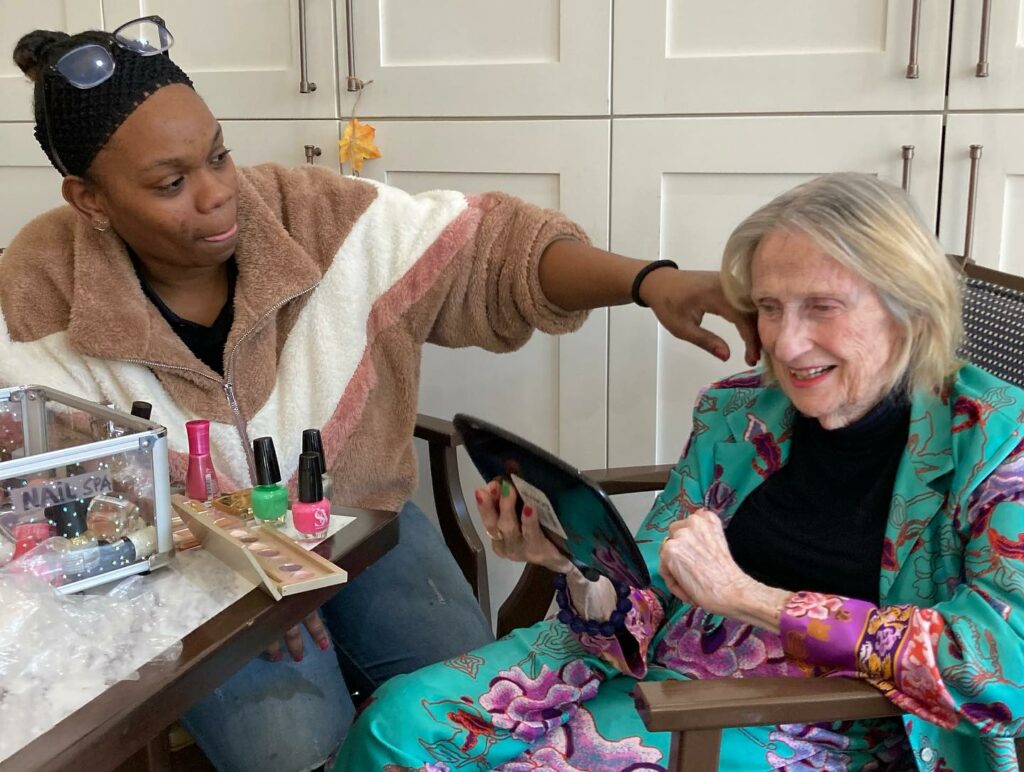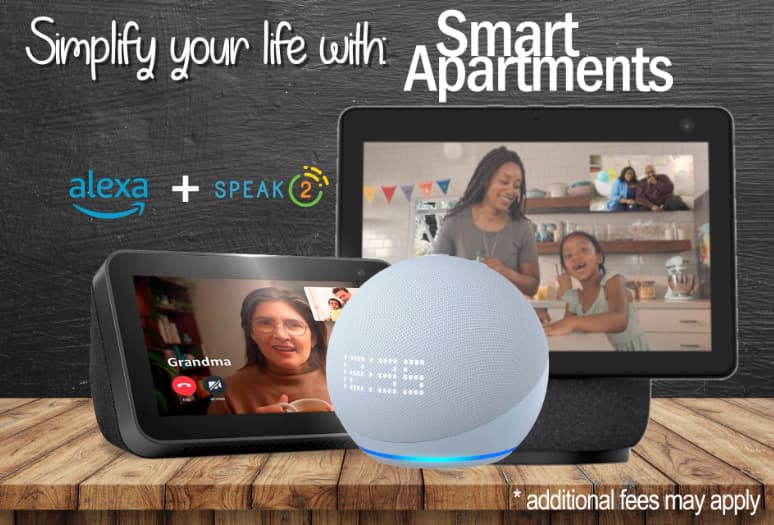Choosing memory care for a loved one is one of the most emotional decisions a family can face. Whether your parent is showing early signs of Alzheimer’s or living with more advanced dementia, you may be asking:
- How do I know they’ll be safe and truly cared for?
- Will they still feel a sense of home, identity, and comfort?
- What’s the real difference between one community and another?
At Legacy Ridge at Marietta, we believe the answer often lies in something simple but powerful: scale. In a smaller, boutique-style memory care community, everything from communication to connection happens more naturally. Residents are known by name and by heart, staff have more time to notice small changes, and every day is structured around familiarity, rhythm, and reassurance.
This article will walk you through the key things families should consider when searching for memory care in Marietta—and why smaller can mean safer, more personalized, and more meaningful for everyone involved.
What to Look for in a Memory Care Community in Georgia

Because the right place isn’t just where your loved one lives—it’s where they are seen, safe, and truly supported.
Choosing a memory care community in Marietta, GA isn’t just about location or a pretty brochure—it’s about finding a place where your loved one can experience dignity, connection, and cognitive safety every single day.
So how do you know if a community truly delivers?
Let’s explore the essentials—plus some you may not have considered.
Specialized Dementia Care, Not Generalized Senior Care
Many communities offer “memory support,” but there’s a major difference between general assisted living with memory support and a dedicated memory care program.
Look for:
- Staff trained specifically in Alzheimer’s and dementia communication techniques, including redirection, non-verbal engagement, and de-escalation
- Therapeutic programming tailored to memory loss, like music therapy, aroma stimulation, storytelling, and tactile activities
- Use of “failure-free” environments, where residents are never set up to feel wrong or confused—only safe and empowered
💡 Ask this during your tour: “Can you walk me through how you approach difficult moments, like confusion or agitation?”
Security That Supports Freedom in Memory Care
Yes, memory care should be secure. But it should never feel restrictive. The best secure senior living communities use discreet safety design that balances protection and comfort.
In today’s boutique memory care settings, that might include:
- Open-air courtyards that are safely enclosed, encouraging movement without risk
- Smart lighting systems that adjust to reduce sundowning confusion
- Wearable tech or motion sensors, not intrusive alarms
- Alexa & Speak2 technology, enabling residents to ask for help instantly, or receive reminders and comforting communication with their care team
These features blend into the environment—preserving dignity while enhancing safety.
Emotional Attunement: Staff Who Know the Human Behind the Diagnosis
Here’s something most websites skip: emotional fluency.
At Legacy Ridge at Marietta and other high-quality memory care communities, staff are not just trained in medical protocols. They’re trained to:
- Understand how grief, pride, and disorientation can coexist
- Use consistent tone and presence to soothe rather than manage
- Recognize the person before the condition
It’s this kind of human-centered care that makes someone feel at home—even when their memory doesn’t always cooperate.
🧠 Did you know? Seniors with dementia who receive emotionally attuned care show up to 30% fewer behavioral challenges (Journal of Geriatric Psychiatry, 2023).
A Daily Rhythm That Grounds and Empowers
You’ll want to know how a community builds its daily structure—because rhythm is everything in dementia care.
Look for:
- Predictable schedules that reduce anxiety
- Personalization (some residents thrive with morning art, others need slow starts and afternoon walks)
- Limited overstimulation: small groups, quiet corners, calming transitions
- Opportunities for purposeful participation (gardening, folding towels, music selection—not just passive entertainment)
🙋 Ask this: “How do you design daily life for different levels of cognitive ability?”
🧭 A Fresh Way to Think About It
Rather than asking, “Will my loved one fit into this community?”
Ask, “Will this community adapt to fit my loved one?”
If the answer is yes—if the community feels like it was built for their strengths, sensitivities, and unique journey—then you’re not just choosing care. You’re choosing continuity, comfort, and connection.
✅ Quick Checklist: What Truly Matters
Element | What to Look For |
Specialized Staff | Alzheimer’s/dementia training, low staff turnover, emotional intelligence |
Safe Layout | Enclosed outdoor space, tech-enabled alerts, subtle safety cues |
Engagement | Purpose-driven activities, sensory stimulation, resident-led moments |
Family Involvement | Flexible visits, real-time updates, integrated care planning |
Atmosphere | Warm, non-institutional, home-like design with personalized routines |
How Small Memory Care Communities Offer Safer, More Personalized Support
What if less really meant more?
In today’s world of big campuses and mega-facilities, the families who choose smaller memory care communities are often quietly discovering something powerful—better care happens when things feel closer, calmer, and more human.
🧭 It’s Not About Size. It’s About Attention.
In small-scale memory care communities, residents aren’t simply cared for—they’re known.
And that knowing changes everything:
- Quicker responses, not because someone’s on duty, but because they already understand your loved one’s baseline.
- Fewer transitions, which reduces stress and confusion in seniors with cognitive impairment.
- Flexible routines that reflect each person’s energy, comfort, and emotional rhythm—not a standard schedule.
👉 The result? A deeper sense of safety—not just physical, but emotional.
🧠 Myth vs. Truth: The Personalized Care Conversation
| Myth | Truth |
| Personalized care means choosing your meals. | True personalized care means your entire day is adapted to how you feel, move, and think—especially in memory care. |
| Technology distances people. | In small communities, tools like Speak2 actually enhance closeness, helping residents ask for what they need—while ensuring staff can track and follow through. |
| Smaller means fewer amenities. | Boutique communities like Legacy Ridge at Marietta offer rich amenities without the overwhelm—like spa rooms, activity lounges, chef-inspired meals, and secured gardens. |
👀 What You’ll Actually Notice in a Small Memory Care Setting
Spend just 10 minutes in a well-run boutique community and you’ll observe:
- A resident getting help before they ask—because someone noticed the hesitation.
- A team member stopping mid-task to share a quiet moment, not just “check on a room.”
- No blaring TVs or overhead intercoms—just calm, quiet, soft music, and focused energy.
- Daily structure that supports cognitive flow: calm mornings, active midday, quiet late afternoons.
These aren’t features—they’re signals of a culture of presence.
🔎 Questions You May Not Know You Should Be Asking
If you’re touring memory care communities, these questions reveal how deep the personalization actually goes:
- Who notices when my loved one skips a meal or looks tired?
- How does your team respond when a resident becomes agitated—do they redirect, validate, or simply isolate?
- Do caregivers stay assigned to the same residents long-term?
- Can I see how a request made through Speak2 gets handled and logged?
📊 Did You Know?
- Residents in smaller memory care communities have 32% fewer hospital visits due to earlier detection of cognitive and health changes (AgingCare, 2023).
- Low staff-to-resident ratios can lead to 45% higher family satisfaction scores, particularly in emotional well-being and communication (National Institute on Aging).
- Familiar caregiver relationships are linked to reduced behavioral episodes and better medication adherence in residents with Alzheimer’s disease (Journal of Dementia Care, 2022).
Personalized Senior Healthcare Backed by Curana Health
Small memory care communities offer the human connection that makes daily life safer and more meaningful—but when that’s paired with on-site, integrated healthcare, the results are transformative.
At Legacy Ridge at Marietta, our partnership with Curana Health brings residents the kind of medical support most families only dream of:
- 🩺 Concierge-style primary care, right where they live
- 🕐 24/7 access to clinicians, including urgent and preventive care
- 💊 Medication reconciliation and reduction of unnecessary prescriptions
- 🧠 Enhanced dementia care coordination through the upcoming GUIDE Model, launching in 2025
- 📉 Proven results like a 55% reduction in fall-related injuries and over 39% fewer hospitalizations
This isn’t just healthcare—it’s value-based care designed for real life, delivered in a setting where every caregiver already knows your loved one’s story.
Because the best kind of safety comes from care that’s both personal and professional—heart-led and evidence-based.
When your loved one lives in a community like Legacy Ridge at Marietta, supported by Curana Health, you can finally breathe easier knowing they’re not just surrounded by comfort…
They’re surrounded by expertise.

Daily Life in Memory Care: Engagement, Comfort, and Familiarity
Because what happens between 8 AM and 8 PM is what defines real care.
When families search for memory care, they often ask about safety, medical support, or credentials—which are all essential.
But what truly shapes your loved one’s day-to-day experience?
The answer lies in the rhythm of daily life—what they feel, what they do, who they interact with, and how they experience joy, peace, and purpose.
At a premier memory care community like Legacy Ridge at Marietta, daily life is carefully crafted around three core pillars: engagement, comfort, and familiarity. Here’s how they come together to create a setting where residents feel not only supported—but at home.
💬 “Will My Loved One Be Engaged?”
Engagement in memory care isn’t just about scheduled activities—it’s about meaningful, consistent stimulation that meets the resident where they are.
Here’s what that looks like in practice:
- Small-group activities designed for cognitive ability and emotional comfort
- Music therapy that reconnects residents with memories and rhythm
- Hands-on tasks like gardening, folding linens, or setting the table—activities that bring back purpose and routine
- 1:1 connections for residents who prefer quiet engagement over social environments
At Legacy Ridge at Marietta, our staff tailor activities based not just on what’s therapeutic, but on what feels familiar and safe. If your loved one loved painting or baking, those memories don’t disappear—they become anchors in their new daily life.
🛋️ “Will They Feel Comfortable?”
Comfort in memory care goes far beyond soft furniture. It’s about creating an environment that soothes the senses, reduces confusion, and helps residents feel in control of their surroundings.
What contributes to real comfort:
- Consistent daily routines (same faces, same breakfast table, same gentle wake-up routine)
- Calm, noise-managed environments that avoid overstimulation
- Design that empowers—like clear signage, wide walking paths, soft lighting, and uncluttered rooms
- Private spaces balanced with warm, social areas so residents can retreat or connect as needed
Comfort is also emotional. Our staff receive specialized training not just in dementia care—but in compassionate communication, so even difficult moments are met with patience, validation, and dignity.
🧠 “Will They Feel at Home?”
Familiarity is the heartbeat of memory care.
When a person is living with Alzheimer’s or another form of dementia, familiarity acts like a compass—it guides them through the day with less anxiety, more clarity, and a stronger sense of identity.
At Legacy Ridge at Marietta:
- Residents often wake up to the same caregiver’s voice
- Their favorite meals are remembered and offered without needing to ask
- They return to the same activity chair, walk the same garden path, or enjoy Alexa voice reminders that gently cue them throughout the day
- Families can even share personal stories or traditions that help us recreate the environment your loved one knows best
These may seem like small things—but in memory care, small things are everything.
❤️ Questions to Help You Understand a Community’s Daily Life
When you’re exploring memory care options, ask:
- How do you personalize daily routines for different stages of dementia?
- What does a “typical” day look like here—and how flexible is it?
- Are activities adjusted based on residents’ energy and mood?
- What sensory elements are used to reduce anxiety or confusion?
- How do you help residents feel connected to their past and present?
If the answers include storytelling, routine, and resident-specific detail—you’re on the right track.
🌞 A Day That Feels Like Themselves
At the end of the day, your loved one may not remember every activity.
But they’ll remember how it felt:
🟢 Safe.
🟢 Seen.
🟢 Familiar.
🟢 Theirs.
And that’s the difference a well-designed memory care lifestyle makes.
Ready to See What Memory Care Can Really Feel Like?
At Legacy Ridge at Marietta, daily life is built around the belief that every resident deserves more than just care—they deserve a life filled with comfort, connection, and purpose.
We invite you to visit our community in person, walk through our peaceful courtyards, see our thoughtfully designed living spaces, and talk with the compassionate team members who make every day meaningful.
Come experience how a small, personalized memory care setting can feel less like a facility—and more like family.
📍 Schedule your private tour today and discover what makes Legacy Ridge at Marietta a trusted choice for memory care in Georgia.
Because peace of mind starts with knowing your loved one is truly at home.







